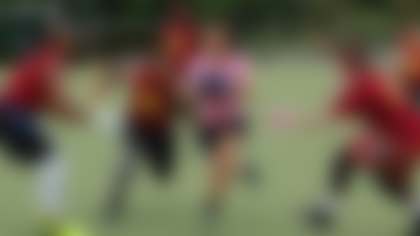Women are rising up the ranks throughout professional football, earning positions of power in a space that for too long was ruled almost exclusively by men. We're seeing more and more women breaking barriers in the sport, but what are the stories beyond the headlines? Who are the women shaping and influencing the NFL today? Answering those questions is the aim of the Next Woman Up series. While the conversational Q&As are edited and condensed for clarity, this is a forum for impactful women to share experiences in their own words. Without further ado, we introduce:
Stephanie Kwok, NFL League Office
Position: Vice President, Head of Flag Football
For those who may not know, what does your job entail?
My role entails leading all of the league's efforts to grow flag football both in the U.S. and globally. That includes everything from growing youth participation, from getting more opportunities for girls and boys to play flag football, working really closely with the clubs because they drive a lot of our efforts to grow flag football at the grassroots level, including high school sanctioning, which is a really big priority for us. I think a lot of people think of flag football as still a recreational sport, but there are increasing opportunities for women to play at the college level, as well. So we work with the NCAA, the NAIA, with junior colleges on increasing those opportunities. Then the last piece I'll mention is obviously with flag football in the 2028 Summer Olympics. That's a huge way that flag football is getting elevated both on the global scale and on the professional level. We also work closely with International Federation of American Football around getting flag football into the Olympics in L.A., looking ahead to Brisbane, and just continuing to promote the Olympics, as well.
What kind of changes have you seen just since starting this job in May?
The momentum that flag football has is so large. I think since starting in the role, in July we held the flag football championships. So that's one of the largest, if not the largest national youth tournaments that we run through the NFL FLAG program. It wasn't the first championship, but it's the first time we really made it into a marquee tentpole event and put all of the NFL's resources behind it. It was broadcast on ESPN, and just being there and being able to see these 15-year-old, 17-year-old boys and girls being able to play on this national, televised stage, I think that was a really big milestone for flag football, a way to expose more people in the U.S. and globally to flag football. That was a pretty big milestone just in the first few months. Also in 2024, five more states have sanctioned girls flag, and that's at a pretty rapid clip, as well, so I think all of the state associations and all of the clubs are just seeing the momentum behind flag football. With all of the regular-season NFL games, seeing all of the ways that clubs are supporting flag football, and highlighting these high school girls teams during the games and during the broadcast, it certainly feels like there's even more momentum than when I first joined.
It's definitely taken the world by storm the last couple months.
Yes, and we've seen so many NFL players excited about the prospect of playing in the Olympics, so I think just knowing that it's an Olympic sport, the players having the opportunity to represent your country drives so much excitement as well.
Can you take me through your career journey to this point and how it led you to this position?
So, I've been in sports for a lot of my career, I'd say, going back even to high school. One of my first jobs was as a ball girl at the U.S. Open; I did an internship at a sports marketing company and at the USTA. Then, after college, I went into management consulting for a few years, and then, after business school, I was determined to get back into sports. So I took a role at Madison Square Garden doing marketing for the New York Knicks, Rangers and Liberty, and that was an amazing opportunity, to be exposed to multiple sports, to work for teams but also to work for a facility in Madison Square Garden. I then worked at FanDuel for about six years, joining when it was a small company and was there through the expansion into sports betting. So I've been in sports for a while, but this is my first official role in football. In some ways, I feel like my career has led up to this.
Football was one of my favorite sports growing up, but I went to New York City public school, and so my exposure to football and my opportunities as a girl, too, were really just tossing the football around in the courtyard. The first time I played organized football was in college playing intramurals. Flag football is one of the most popular intramural sports, but that was my first time playing organized football. And that was touch football, and when I got to business school, that was actually the first time I was exposed to flag football. In business school, I ran all of the sports teams for my section, and I was also sports commissioner, so I oversaw all of the sports leagues and competitions for the business school. I spent a lot of my time doing that, kind of a little job in itself. After business school, while I was at Madison Square Garden and FanDuel, I was playing flag football three times a week in New York City, and I ran a flag football tournament company on the side with a few friends. Taking this role at the NFL, having the opportunity to combine the industry experience that I have in sports with that very real personal passion for flag football, that just felt like a dream opportunity.

You mentioned your history of playing flag football. How special is it to work toward the growth of a sport you have that personal relationship with?
It's so special. As a personal anecdote, my partner coaches middle school flag football at the middle school that we went to. Seeing that there's an opportunity to play flag football, that's an opportunity I wish I had had, and as I was at the flag championships and as I meet kids, both girls, boys and their parents, and hear their stories about how they found their way to flag football and the opportunities they see in it, that's so special. There are so many stories I've heard -- girls who have seen their brothers and their cousins playing football, and love playing football, and they may be the football fan in the household, but until they found flag football, there wasn't an opportunity to compete and to be on a team. And similarly, there are boys who wouldn't have played tackle for various reasons, and flag football is again an opportunity for them to be connected to the game. Hearing those stories and seeing that it's an opportunity to play on the school team, to have that connection, and also to travel around the country playing in competitive tournaments, that's something that I was kind of vicariously doing as an adult, and so it's amazing to be part of helping create those opportunities.
What do you see the future of flag football being, and what are your hopes for it?
Flag football is growing so quickly, and there are so many things that are amazing about flag football, but we talked about how it really provides inclusivity and accessibility for girls and women. The other piece is the international growth. I think flag football is so accessible and has so many skills that cross over with other sports that are popular in other countries, whether it's rugby or soccer, with the speed and agility. It is interesting to think of flag football as the second coming of soccer. Is flag football something where if we think beyond the U.S. and we think about globally how popular it could become, I think it can become just as popular, if not more popular than soccer. I think within the U.S., we're already seeing opportunities for girls to play at the college level, the Olympics are another opportunity, so I think we could be in the place of having a national championship at the college level, having it be an official NCAA sport for women before the Olympics. Then you start to think about if it's a high school sport, a college sport, an Olympic sport, what other opportunities are there? Could we have a pro league for women -- or for men -- in flag football? In the way we've seen pickleball explode over the last few years, I think maybe flag football could be on its heels.
We've touched on the Olympics. How important is it to get that platform going forward?
I think two things. The Olympics decision is relatively recent, so even before that decision, it was growing so quickly at the grassroots level. I think there was so much pent-up demand, frankly, for something like flag football. So I do think there was so much momentum, even before the Olympics decision. That being said, the Olympics just provides this unique platform. First, there's just so much inspiration and interest around the Olympics that with flag football as an official sport, I think we are already seeing and we will see so many countries invest more in flag football, and that will help continue to grow the game globally. I think what's also very interesting for the NFL is that a form of American football is going to have this huge global stage. And if NFL players do play in the Olympics, then that's also an interesting global stage to expose more people to NFL players, even if they're not playing tackle football. I think not just on the U.S. team, there's so many NFL players who are from or have roots in other countries, so I think that would be really interesting, to see some of the matchups in the Olympics, if NFL players do play.

Do you have any advice for women who want to pursue a career in sports or in marketing, consulting leadership roles, or both, like yours?
One is looking at opportunities across a lot of different areas, so fully exploring what all of those opportunities are. I think it can be easy to jump to, "I want to work at a team," or, "I want to work at a league," but there are so many companies that touch sports that might not directly be a team or a league. Brands that are sponsors, for example, or agencies that work with teams and leagues. So one piece of advice would be to look at that full universe of opportunities. Another thing would be meeting people, having conversations, learning what people do and making those connections. There's such high demand for roles in sports, and I think there's a saying, "It's not who you know, but who knows you." Making those connections, even if there isn't an opportunity right away, that's actually the best time to make a connection, because it's less transactional, it's more about building that relationship, and as you build that relationship, there may be opportunities down the line. Most of the roles I've had in sports have been very much about relationships. I had so many conversations, not interviews but conversations, before I landed those roles. Just to understand what the opportunities were and to make those connections.
Have you had any mentors on your career journey who have impacted you?
I've certainly had a lot of bosses and colleagues that I take different things from, and I've certainly had some bosses who I think of as advocates. One of my first bosses in my first job out of college, I've modeled a lot of my management style off her. She was an amazing boss who showed me servant leadership. She was always in the trenches with us if we had late nights, even if she didn't need to be there and if other folks at her level weren't there. She was always offering to help and take things off our plate. She gave us choice in what we worked on, as opposed to dictating out the work, and she just created a fun team atmosphere. She would come on team outings with us as well, so she really helped. I don't know if she knows this, but she really helped mold me into the manager and leader that I am, so she's one of the first people that come to mind. And when I was at FanDuel, a few of my leaders there were really big advocates for me. I think that's really big for anyone, but especially for women or for people of color in sports. I think it's really helpful when you have someone who says your name in the room and who is looking out for opportunities for you. They were really key in helping me to advance when I was at FanDuel.













